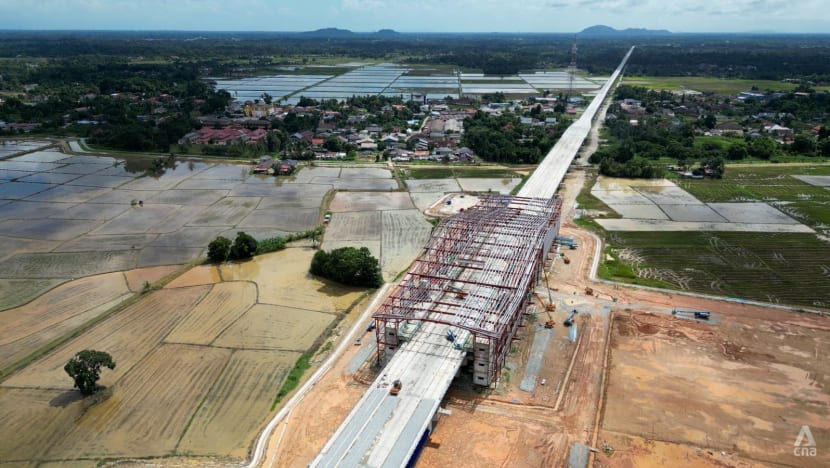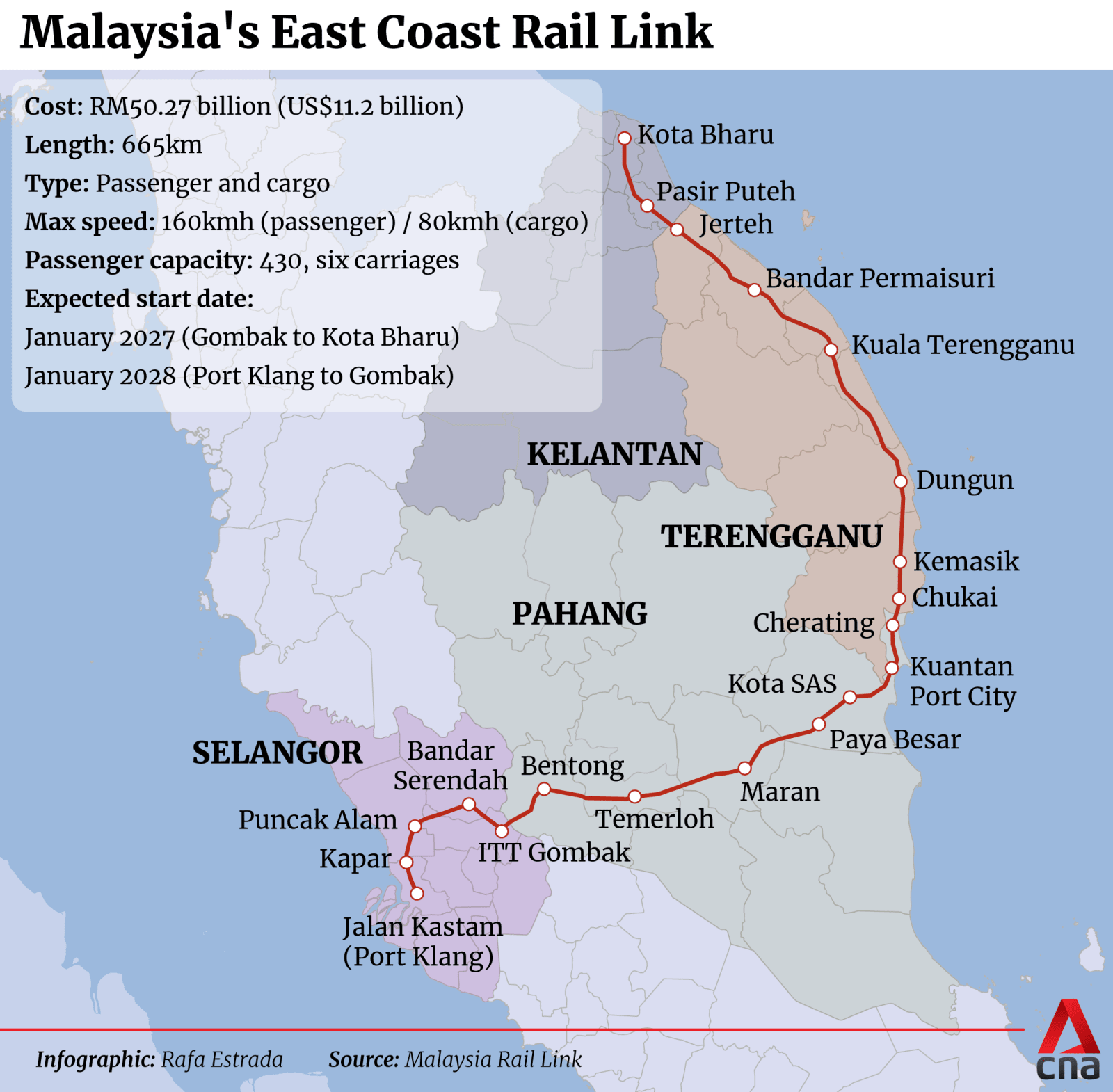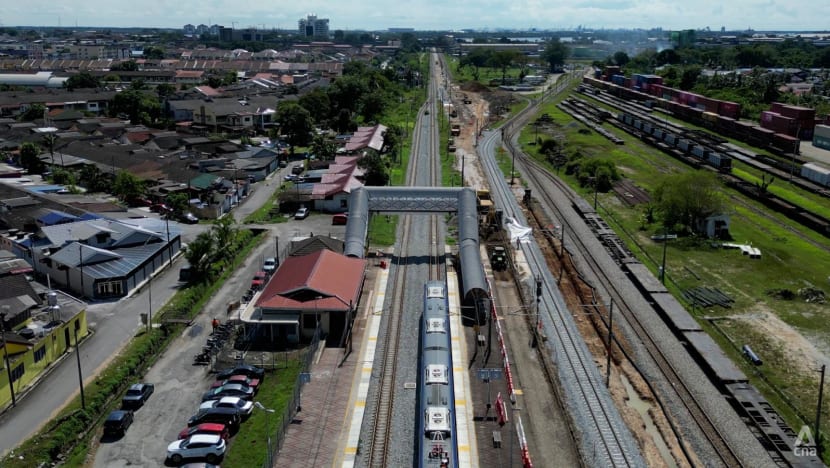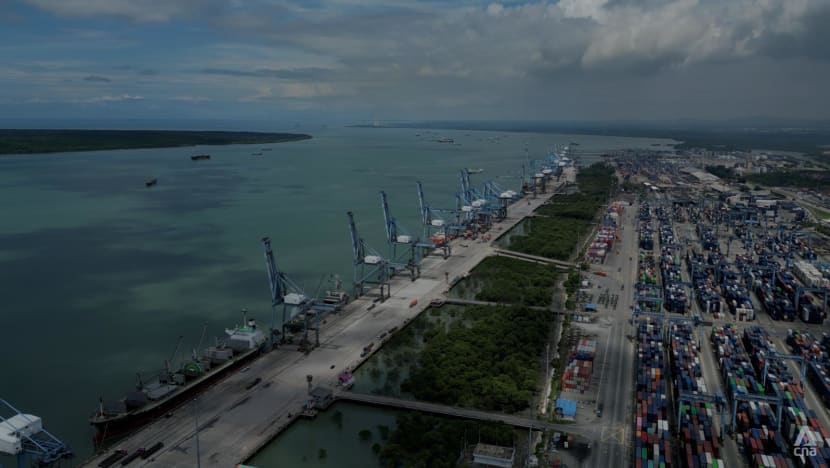Malaysia’s East Coast Rail Link: Project at risk of delay from cable, equipment theft
Over 1,200m of signalling cables have been reported stolen from at least seven locations along the mega-project’s alignment, with 81 outdoor transformer units also removed.

ECRL station construction in Kota Bharu, Kelantan. (Photo: CNA/Hari Anggara)
KUALA LUMPUR: Reported theft of signalling equipment and communication cables could derail Malaysia’s much-anticipated East Coast Rail Link (ECRL) at a critical phase before its target completion, according to the project’s owner.
Chief executive officer of Malaysia Rail Link Sdn Bhd (MRL) Darwis Abdul Razak said several cases of theft had been detected at specific locations along the ECRL track which spans Kelantan, Terengganu, Pahang and Selangor, reported local media on Monday (Jun 23).
“These incidents not only raise the cost of repairs and replacements but also risk delaying the train testing and commissioning schedule, which is expected to begin in June 2026,” Darwis said in an interview with a Malaysian media delegation in Beijing.
The project’s targeted completion is December 2026.
Over 1,200m of signalling cables have been reported stolen along its alignment, with 81 outdoor transformer units also removed, according to The Star.
Since the start of the communications, information and signalling systems installation at the Kota Sultan Ahmad Shah Station in Pahang in March, the thieves have struck at least seven locations.
These include Paya Besar, Cherating, and Kuantan Port City in Pahang, Chukai, Dungun and Kemasik in Terengganu as well as Pasir Puteh in Kelantan, reported local media.
Darwis, quoted by Bernama, said 2025 marked the most critical phase of the project, with the installation of communication, information, and signalling systems underway at the Kota Sultan Ahmad Shah station, and due to proceed simultaneously at other stations soon.
At areas near that station, ECRL’s main contractor - China Communications Construction Company (CCCC) - discovered that some fibre optic cables had been left behind after being cut.
While the extent or value of the damage has not been officially disclosed, The Star reported that fibre optic cables are considered worthless in the scrap market as they do not contain metal and the 1,200m of stolen signalling cable contained some metal.
According to MRL, the thieves had used non-professional cutting tools to get the job done hastily and even came with transportation.

In response to concerns raised by MRL, Transport Minister Anthony Loke said on Monday that he had asked the police to take firmer action against cable theft incidents along railway tracks.
“Firstly, MRL will implement mitigation measures to ensure greater safety at the site. However, I have also contacted the home minister to request that the police take firmer action on this matter,” he said, as quoted by Yahoo News.
He added that such theft is not exclusive to the ECRL but has also plagued Peninsular Malaysia’s main rail operator, Keretapi Tanah Melayu (KTM).
Loke said cable theft should not be treated as a normal crime, as it poses a threat to national security.
“I have openly called for the police to treat this not merely as a case of theft. This involves public safety, it disrupts public order, and it affects national security.
“Therefore, stricter action under more stringent laws should be taken. That said, I will leave it to the discretion of the police to decide the appropriate course of action, but we cannot treat this as just an ordinary case of theft,” he added.
With operations set to begin in 2027, MRL’s Darwis said that if CCCC fails to complete the project on time, the conglomerate could incur losses of RM1.25 million (US$292,021) per day.
MRL, a wholly-owned subsidiary of the Ministry of Finance (Incorporated), is the owner of the RM50 billion mega infrastructure project, while CCCC is the main contractor.
As the project owner, MRL has lodged police reports on the recent incidents and is stepping up security measures, including the appointment of a dedicated security firm to monitor and safeguard ECRL assets on the ground, Darwis told the media.
“We are also counting on continued cooperation from the authorities and local communities to help curb this crime. This is a national project that we must protect together,” said Darwis, as quoted by local news agency Bernama.
He also plans to meet with Home Minister Saifuddin Nasution Ismail and the police chiefs of the affected states to seek their cooperation and solutions to the issue.

According to Bernama, the project was 83.38 per cent complete as of May, on track to meet its targeted deadline of December.
In other developments, Darwis said the first two electric multiple-unit train sets, along with two electric locomotives for freight operations were expected to arrive in Malaysia by the end of the year, with subsequent sets arriving in stages from April 2026.
“System and train testing and commissioning are scheduled to begin in June 2026. This is a crucial phase that will determine our readiness to begin operations,” he said.
The ECRL megaproject linking the Klang Valley in Selangor to the east coast states in Malaysia aims to cut the journey from Gombak, Selangor to Kota Bharu, Kelantan from at least seven hours by car to around four hours by train.
Spanning 665km, it is the largest infrastructure project under China’s Belt and Road initiative in Malaysia.
With speeds of up to 160kmh, the ECRL travels through the Titiwangsa mountains dividing peninsular Malaysia before snaking its way across the vast east coast carrying both goods and passengers.

The ECRL was announced in 2016 as a main infrastructure connectivity project that will help propel the Malaysian economy into the top 20 nations by 2050.
The line from Kota Bharu, Kelantan to the Gombak Integrated Terminal, Selangor was scheduled for completion by December 2026 and to be operational from January 2027.
It is also expected to create an economic spillover effect for local residents as investors set up industries along the line.
A rail extension from Gombak to Port Klang is expected in December 2027.
MRL - which will own all ECRL assets - has set up a joint venture company with ECRL’s main contractor CCCC - to operate the rail line.
The joint venture means the two entities will jointly share the costs of operating the ECRL and exchange technical know-how and expertise.
Under the arrangement, if the ECRL operates at a deficit, MRL and CCCC will each bear 50 per cent of the risk. If the ECRL operates at a surplus, MRL will get 80 per cent of the earnings, while CCCC will get the remaining 20 per cent.
















